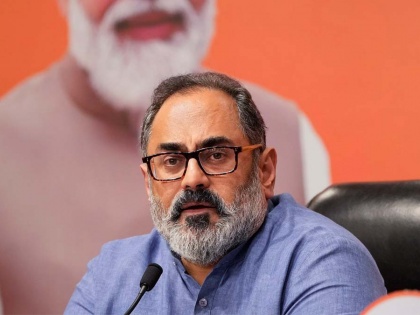DNPA Conclave 2024: Rajeev Chadrasekhar Highlights Government Concerns Over Ad-Tech Monopolies
By Lokmat English Desk | Published: February 7, 2024 05:52 PM2024-02-07T17:52:20+5:302024-02-07T17:53:58+5:30
At the DNPA Conclave and Awards 2024, Minister for State for Electronics and Information Technology, Rajeev Chandrasekhar, emphasized India's ...

DNPA Conclave 2024: Rajeev Chadrasekhar Highlights Government Concerns Over Ad-Tech Monopolies
At the DNPA Conclave and Awards 2024, Minister for State for Electronics and Information Technology, Rajeev Chandrasekhar, emphasized India's remarkable digital transformation and the government's commitment to addressing ad tech monopolies. He highlighted concerns about the imbalance between content creators and platforms controlling monetization, indicating a priority to legislate or regulate this asymmetry. Chandrasekhar discussed the Digital India Act's draft, aimed at rectifying these disparities and ensuring fair revenue sharing between tech giants and media organizations.
Responding to a query on ad-tech monopolies, Chandrasekhar said, “We are concerned about the deep asymmetry between those who create content and those who help them to monetise it. From a policymaking point of view, we want the internet to be open, and we certainly do not want monetisation on the internet to be in the purview of or to be controlled by just one, two, or three companies.” He added that the pre-consultation draft of the Digital India Act lays the foundation for solving these “visible asymmetries” between the Indian content creation ecosystem and the big platforms. “These big tech platforms are gatekeepers to monetising the content, and that asymmetry needs to be legislated, or at least regulated, through the rules of new legislation. And I’m hopeful that after PM Narendra Modi ji resumes office (in the third term), this will be one of his priorities,” he added. He said that there will need to be consultations to arrive at a framework to address this issue.
Additionally, he acknowledged challenges such as fake news and deepfakes, underscoring the need for legislative measures to protect citizens' rights while upholding digital content integrity. Chandrasekhar referred to the legal dispute between the New York Times and OpenAI as a pivotal case shaping the digital content ecosystem's rights. Meanwhile, Information and Broadcasting Minister, Anurag Thakur, echoed concerns over digital advertising issues, emphasizing the government's commitment to preventing revenue loss. He highlighted the detrimental impact of fake news and clickbait on news media credibility, stressing the importance of combating misinformation through responsible journalism and regulatory measures. Both ministers underscored the need for a robust regulatory framework to ensure fair digital content monetization, combat misinformation, and uphold the integrity of India's digital ecosystem.
Secretary S. Krishnan of MeiTY addressed the emergence of AI and highlighted the inadequacy of current laws in addressing these evolving challenges. He emphasized the necessity of categorizing internet intermediaries and implementing distinct regulatory frameworks for each category. Krishnan also noted the difficulties arising when content generated by a news publisher, backed by fact-checking, is equated with content from individuals expressing opinions on platforms.